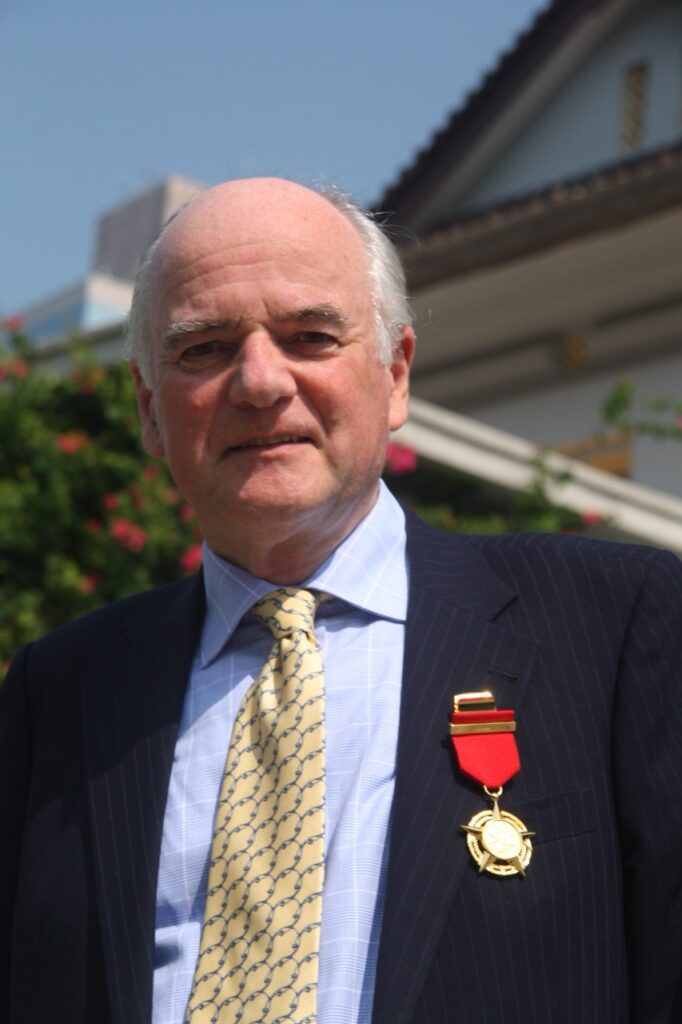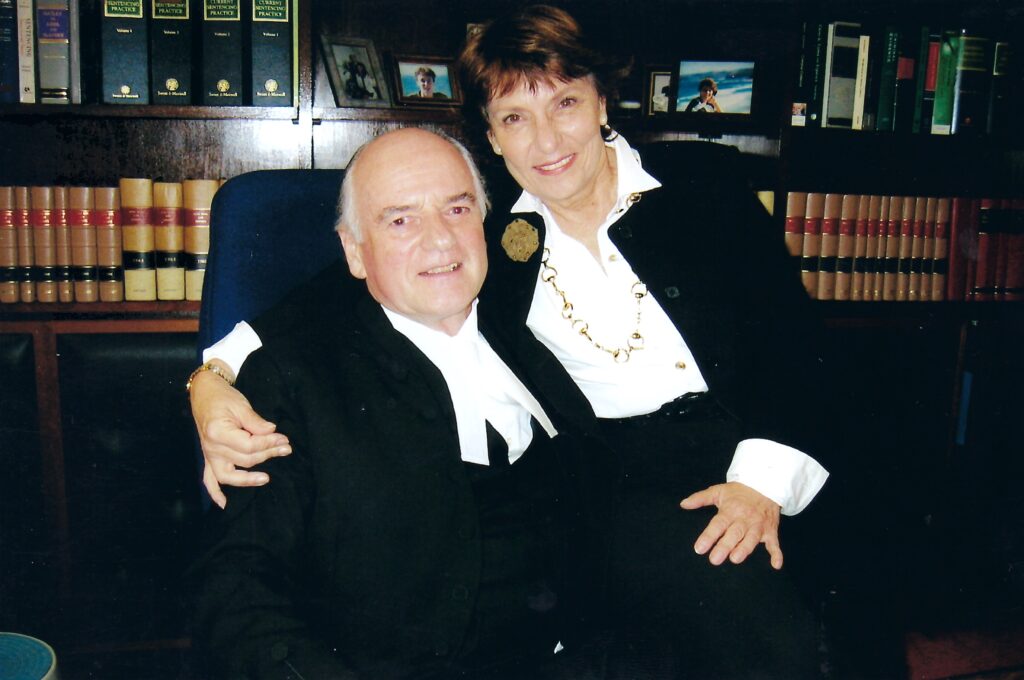
The appointment of a top British barrister as a High Court Judge in Hong Kong raised a few eyebrows in 1993, a time when the judiciary was being encouraged to rely less on overseas talent.
But Michael Stuart-Moore, arriving four years before the city returned to Chinese rule, proved to be a valuable acquisition. He served for 26 years, handling some of Hong Kong’s best-known criminal cases.
Stuart-Moore, also known as Stuart, died in Australia in December, aged 80. His many friends and former colleagues in Hong Kong were shocked and saddened by the news.
Chief Justice Andrew Cheung Kui-nung, in a letter of condolence, described him as ‘not only an outstanding judge, but also an excellent colleague’ who made a substantial contribution to the criminal law.
Fellow judges said Stuart-Moore’s no-nonsense approach and commitment to high standards saw him quickly forge a formidable reputation.
‘He soon became known for his industry and efficiency and ability to handle the most difficult cases,’ Mr Justice Frank Stock said.
Stuart-Moore loved tennis and cricket and was an accomplished flautist with a taste for Mozart. Stock said he hated the pomposity of any kind and had a mischievous sense of humour.
After leaving school in England, he headed to India to teach English and cricket in 1962, developing a lifelong passion for the subcontinent.
‘He would occasionally and, for no apparent reason, burst into Hindi, delighting in the fact we couldn’t understand him,’ Stock said.
After a year in India, he returned to England, unemployed and penniless and found his way into the Middle Temple, where he started to learn the law. And there, Lady Luck unexpectedly played a card which determined his future and his fortune.
While walking down Middle Temple Lane one day, returning from the Old Bailey, he heard a policeman shouting, ‘Stop! Stop! Stop that thief!’ He turned and saw the policeman, and then in front of him, he spotted the thief. He dropped his bags, ran after the man, brought him down with a rugger tackle and pinned him against a lamppost until the policeman caught up. That was good enough, but what was even better was that behind him, further down the lane, were Sebag Shaw and John Lloyd-Eley, two leading criminal lawyers of the day, QCs and well-known names in the Old Bailey… and the whole thing had taken place in front of their astonished eyes.
Stuart’s trousers were torn, his shoe was ripped off, and as he picked up his bags and brushed himself down, they approached him and said, ‘Young man, you’ll need money to buy new trousers and new shoes, so you’d better come and work with us.’ And in that way, he got into Number 1 Hare Court as a pupil of Lloyd-Eley there to start his long career in criminal law.
He was Called to the Bar in 1966. He worked as a defence lawyer but made his name as a prosecutor in high-profile trials at the Old Bailey.
Dick Kirby, a former officer with Scotland Yard’s famous Flying Squad, said: ‘In the course of my career, I met several very good barristers, but Stuart stood out, head and shoulders above the rest.’
This was because he would visit the crime scene to get the feel of the place and be ‘right on the ball’ in court, Kirby said. He built a reputation for winning.
Stuart-Moore gained his first experience as a judge in the United Kingdom in 1985, sitting as a Recorder. He became a Queen’s Counsel in 1990.
He accepted an invitation to join Hong Kong’s judiciary in 1993, quickly making his mark.
In 2008, Stuart-Moore upheld the murder conviction of American Nancy Kissel for drugging her banker husband Robert with a spiked milkshake and battering him to death in their luxury flat.
Stuart-Moore made headlines in 1996 when he sentenced disgraced tycoon George Tan Soon-gin to three years in jail for conspiracy to defraud.
The case involved US$238 million in secret loans obtained by the Carrian property empire from Malaysian Bank Bumiputra.
He told Tan: ‘Your skill and perhaps also your greed led you from a decent, useful life to dishonesty on a grand scale.’
Then came the trial of ‘King of Thieves’ Yip Kai-foon, once Hong Kong’s most wanted man. Stuart-Moore jailed him for 41 years, for possession of arms and explosives, saying: ‘You have little or no respect for human life.’
Geoffrey Ma Tao-li, a former Chief Justice, said criminals were not the only ones to be chastised by the judge: ‘He did not suffer fools. He wanted to get to the heart of the problem. He would get a little impatient with lawyers who did not do much work or assist the court. He wanted to get a just and fair result.’
But the judge was ‘immensely popular’ with his staff, Stock said, treating his clerks, ushers, interpreters and drivers with ‘great respect, courtesy and consideration’.
Stuart-Moore was swiftly promoted to the Court of Appeal and was appointed one of its vice-presidents in 1999.
Stock said: ‘he ran a tight ship, conscious always of the stream of appeals and appellants waiting to be heard. His workload was prodigious, and the volume of significant judgments he produced with little delay was immense.’
Stuart-Moore officially retired in 2009. At the time, then-Chief Justice Andrew Li Kwok-nang described him as ‘without peer’ as a jury trial judge.
But he was soon back on the Bench, as a deputy judge handling jury trials, which he loved.
In 2016, the judge jailed Rurik Jutting, a British banker who brutally murdered two Indonesian women, for life. He said the killer had not shown a shred of remorse.
Former top judge Ma said Stuart-Moore was ‘consummately professional’, adding: ‘he was a person who wanted to get the right result.’
Mr Justice Kevin Zervos said, ’he lived and breathed the criminal law. He was instinctively drawn to what was important. As an appellate judge, he was always keen to ensure that the fundamental principles of fairness were properly applied. He would not hesitate to write a wrong or call out a miscarriage of justice. He did what was right.’
Outside court, Stuart-Moore was a ‘social animal’ who was largely responsible for establishing the ‘judges’ table’ at the Hong Kong Club, Stock said.
He was also devoted to his family, his wife Katherine, to whom he was married for 51 years, his children James and Zoe and three grandchildren. He spent the final years of his life in Brisbane, Australia.
Stuart-Moore expressed confidence in Hong Kong’s legal system on the eve of the city’s return to Chinese rule, saying, ‘The judiciary will keep its independence, and the new generation will carry forward the common law traditions, procedure and laws well into the foreseeable future.’
The judge was awarded the Gold Bauhinia Star in 2009.
Stuart-Moore would be missed and fondly remembered, his fellow judges said.
Zervos said, ’he sought to bridge the gap between the law and the community, and his decisions reflected a keen desire to do justice, recognising the human element of the law. The community owes a huge debt of gratitude to Stuart, who was steadfast in upholding the rule of law.’
Reproduced with kind permission from the South China Morning Post. Including some detail from Master Stuart-Moore’s family.


